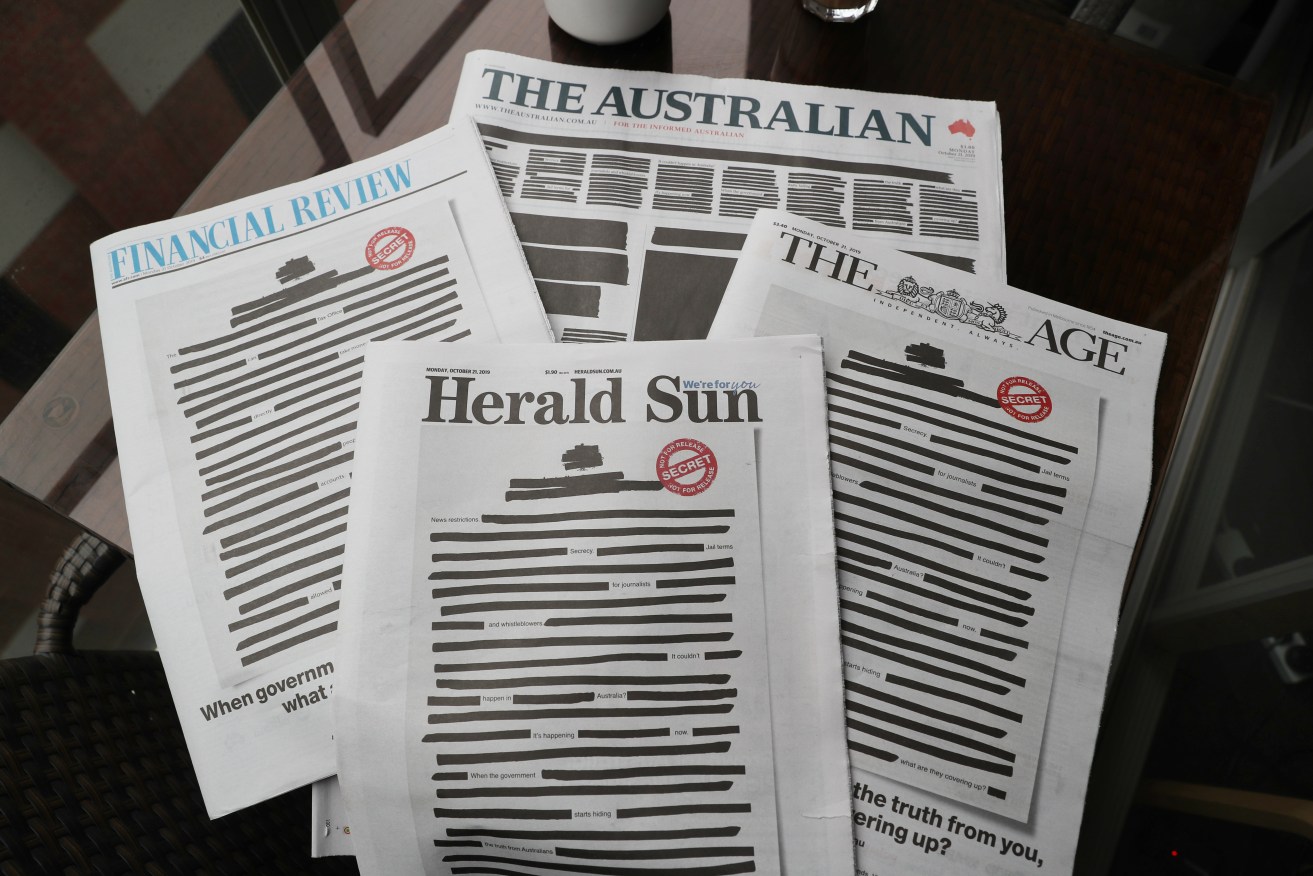AFP to review investigations as media campaigns against Govt secrecy, censorship
The new head of the Australian Federal Police has ordered a review into the handling of sensitive investigations, following raids on two media organisations.

Newspapers replicated redacted document front pages to launch the "Australia's Right To Know" campaign. Photo: AAP/David Crosling
Reece Kershaw wants to examine AFP processes around unauthorised disclosures, parliamentary privilege, espionage, foreign interference and war crimes.
He has asked John Lawler, the former head of the Australian Crime Commission, to conduct the external review.
“The review will not be an audit into the current matters at hand,”Kershaw told a Senate committee in Canberra on Monday.
“But rather a holistic approach to ensure that we have in place investigative policies and guidelines that are fit for purpose.”
The review will address what constitutes a sensitive investigation, an articulation of the human resources, skills, training, technology and facilities required, a reformation of governance and business processes, and organisational structures.
“Police independence and freedom of the press are both fundamental pillars that coexist in our democracy,” Kershaw told the committee.
“I strongly believe in these two pillars, and this is the approach I intend to take.”
He also confirmed the AFP had finalised an “internal national guideline” on investigations into the leaking of government information by Commonwealth officers.
Recent police raids on the home of a News Corp journalist and Sydney offices of the ABC have triggered a major debate about press freedom.
The raids were part of criminal investigations into stories based on leaked government documents.
Kershaw said he hoped the Lawler review would “better inform” how the AFP handled such cases in the future.
“I look forward to working with you and your parliamentary colleagues to ensure the review takes into account the deliberations of other parliamentary inquiries currently under way,” he said.
It comes as major commercial and public media companies launched a campaign warning against creeping laws that allow elected governments to cover-up scandals and hide or restrict information.
The front pages of the major newspapers on Monday replicated a heavily redacted government document, alongside an advertising campaign challenging laws that effectively criminalise journalism and whistleblowing.
The front pages warn federal and other governments are pursuing restrictions on news reporting, asking “when government keeps the truth from you, what are they covering up?”.
Australians should always be suspicious of governments that want to restrict their right to know what’s going on,” News Corp Australasia’s executive chairman Michael Miller said.
Just weeks after the May federal election, federal police officers raided News Corp journalist Annika Smethurst’s home over a national security story she had written more than a year earlier.
The next day, police raided ABC offices about another national security story two journalists had written two years earlier.
The raids made international news, but so far none of the journalists involved has been told whether or not they will face jail time for reporting in the public interest.
“This is much bigger than the media. It’s about defending the basic right of every Australian to be properly informed about the important decisions the government is making in their name,” Nine Entertainment chief executive Hugh Marks said.
“Australia is at risk of becoming the world’s most secretive democracy,” ABC managing director David Anderson said.
New research reveals 87 per cent of Australians value a free and transparent democracy where the public is kept informed – but just 37 per cent believe this is happening in Australia today.
Some 88 per cent of Australians want stronger protections for whistleblowers who play a vital role in calling out wrongdoing in society.
And more than three-quarters believe journalists should be protected from prosecution when reporting in the public interest.
The media companies want law changes so journalists don’t fear imprisonment for doing their jobs and stronger protections for whistleblowers.
More than 60 new laws have been put in place over the past 20 years, which media companies say effectively criminalises journalism and penalises whistleblowing.
More information about the media campaign against the government can be found at yourrighttoknow.com.au and on social media under #righttoknow.
Meanwhile, One Nation leader Pauline Hanson believes journalistic credentials need to be toughened up to stop anyone from calling themselves a journalist, again raising the prospect of a licensing system.
“But we’ve got to be very careful who we define as being a journalist. People who write a book could be classified as a journalist or those people that blog on Facebook,” she told the Nine Network.
“But I believe that people must be accountable to the public whoever they are, what position they are in.”
The issue of a licensing system for journalists has been raised in the past because effectively, in Australia, anyone can call themselves a journalist.
But opponents have pointed to China’s restrictions on reporters, raising questions about who or what authority should decide if someone can work as a journalist.
Hanson said she didn’t think the right to know media campaign would resonate with Australians, although “I think it should”.
-AAP
Want to comment?
Send us an email, making it clear which story you’re commenting on and including your full name (required for publication) and phone number (only for verification purposes). Please put “Reader views” in the subject.
We’ll publish the best comments in a regular “Reader Views” post. Your comments can be brief, or we can accept up to 350 words, or thereabouts.
InDaily has changed the way we receive comments. Go here for an explanation.




